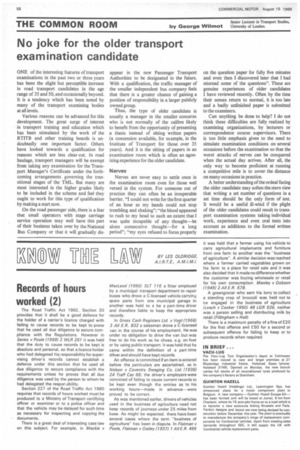No joke for the older transport examination candidate
Page 60

If you've noticed an error in this article please click here to report it so we can fix it.
ONE of the interesting features of transport examinations in the past two or three years has been the slight but perceptible increase in road transport candidates in the age range of 35 and 50, and occasionally beyond. It is a tendency which has been noted by many of the transport examining bodies at all levels.
Various reasons can be advanced for this development. The great surge of interest in transport training and education which has been stimulated by the work of the RTITB and other training boards is undoubtedly one important factor. Others have looked towards a qualification for reasons which are less clear-cut. In road haulage, transport managers will be exempt from taking any examination for the Transport Manager's Certificate under the forthcoming arrangements governing the transitional stages of the TML. But many are most interested in the higher grades likely to be included in the scheme and feel they ought to work for this type of qualification by making a start now.
On the road passenger side, there is a fear that small operators with stage carriage service operation may well have this part of their business taken over by the National Bus Company or that it will gradually dis
appear in the new Passenger Transport Authorities to be designated in the future. With a qualification, the traffic manager of the smaller independent bus company feels that there is a greater chance of gaining a position of responsibility in a larger publicly owned group.
Thus, the type of older candidate is usually a manager in the smaller concerns who is not normally of the calibre likely to benefit from the opportunity of presenting a thesis instead of sitting written papers (a concession available, for example, in the Institute of Transport for those over 35 years). And it is the sitting of papers in an examination room which is often an agonizing experience for the older candidate.
Nerves
Nerves are never easy to settle once in the examination room even for those well versed in the system. For someone out of practice they can often be an insuperable barrier. "I could not write for the first quarter of an hour as my hands could not stop trembling and shaking"; "the blood appeared to rush to my head to such an extent that I was quite incapable of any thought—let alone consecutive thought—for a long period"; "my eyes refused to focus properly on the question paper for fully five minutes and even then I discovered later that I had misread some of the questions". These are genuine experiences of older candidates I have reviewed recently. Often by the time their senses return to normal, it is too late and a badly unfinished paper is submitted to the examiners.
Can anything be done to help? I do not think these difficulties are fully realized by examining organizations, by lecturers or correspondence course supervisors. There is too little emphasis given to the need to simulate examination conditions on several occasions before the examination so that the worst attacks of nerves can be conquered when the actual day arrives. After all, the only way to become proficient at running a competitive mile is to cover the distance on many occasions in practice.
A better understanding of the ordeal facing the older candidate may soften the stern view that writing a set number of questions in a set time should be the only form of test. It would be a useful ill-wind if the plight of the older candidates could result in transport examination systems taking individual work, experience and even oral tests into account as additions to the formal written examination.






































































































